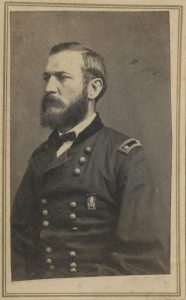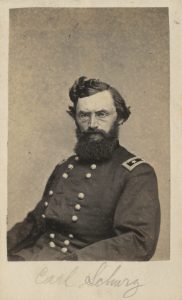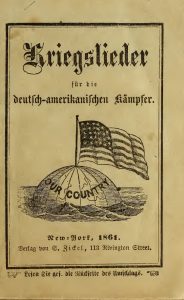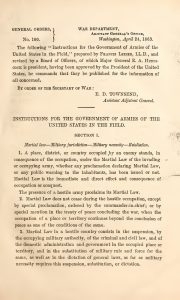From the Collection: German-Americans in the Civil War Era
From the Collection: German-Americans in the Civil War Era
Kayla Gustafson and Jessie Cortesi
In honor of German-American Heritage Month in October, librarians at the Rolland Center for Lincoln Research launched a new digital exhibit on lincolncollection.org highlighting items in the Lincoln Financial Foundation Collection related to German-Americans from the Civil War period.
From 1845 to 1855, more than one million Germans fled to the United States to escape economic hardship and political unrest in Europe. German immigrants possessed a wealth of political and military knowledge that President Abraham Lincoln would utilize in the coming Civil War. Following the start of the war, numerous German-Americans joined the side of the Union to defend freedom. As members of antislavery societies, they rallied for a Union victory and railed against slavery. Many German-American soldiers rose quickly through the ranks, playing an important part in the Union victory.

Godfrey Weitzel (1835–1884) was a German immigrant and a skilled Union general. He and his company served as Lincoln’s bodyguards during the first inauguration. In 1864, he took command of the Twenty-fifth Corps, the first army corps made up entirely of Black troops. In April 1865, Weitzel and his troops participated in the capture of Richmond. Weitzel sent a telegram to General Grant: “We took Richmond at 8:15 this morning. I captured many guns. The enemy left in great haste. The city is on fire in two places. Am making every effort to put it out. The people received us with enthusiastic expressions of joy.” When Lincoln visited the city the following day, Weitzel welcomed him at his headquarters—Jefferson Davis’ presidential residence.

Carl Schurz (1829–1906) immigrated to the U.S. in the early 1850s and became involved in the newly-formed Republican Party. In 1860, he delivered speeches and rallied German-American voters in support of Abraham Lincoln. During the war he served as a brigadier general under General John C. Frémont, and later General Franz Sigel (another German immigrant). After the war, Schurz became editor of the Detroit Post, and in 1868 he became the first German-American elected to the U.S. Senate. President Rutherford B. Hayes appointed him as secretary of the interior in 1877.

The Kriegslieder für die Deutsch-Amerikanischen Kämpfer, or War Songs for the German-American Fighters, was published in 1861 for the German-American soldiers that enlisted in the Union army. The German population was no more than five percent of the overall U.S. population, but they represented more than ten percent of Union soldiers.

Francis Lieber (1800–1872), a political philosopher and college professor, opposed slavery and became Lincoln’s legal advisor. He authored the Lieber Code (issued as General Orders No. 100 in April 1863), establishing standards of soldiers’ conduct in wartime. The Lieber Code remains a foundation for the laws of war in the United States.
